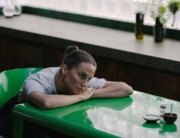Chie Hayakawa’s debut feature begins in a somewhat familiar dystopian landscape. A man wanders around what looks like an eerily empty retirement home, dimly lit, while classical music plays in the background. He holds a shotgun and wears a head lamp. He sits down and makes a cryptic proclamation, perhaps a recording, that he hopes others will follow his example. As the music stops, a radio announcer takes over, announcing the inauguration of the Japanese government’s assisted euthanasia program, Plan 75, for those ages 75 and up, created in response to a glut of seniors in Japan and an increase in hate crimes against them. The man then takes the shotgun and kills himself.
If this dark, dire atmosphere seems somewhat familiar to those well versed in dystopian tales, the film quickly becomes something quite different. The emphasis here is not on melodrama, not on isolated men hiding with shotguns, but on the banal and slowly debilitating. Each of the three characters we follow are connected to Plan 75 in a different way. Himoru (Hayato Isomura) is a young, cheery, earnest salesman, whose belief in the program is shaken when his estranged uncle (Taka Takao) shows up in his workplace hoping to sign up and end his life. Maria (Stefanie Arianne), a young Filipino woman, accepts a menial job with Plan 75 in order to pay medical expenses for her daughter back home. Michi (Chieko Baisho), in truth, the central character, is a 78-year-old hotel worker who, with her equally older coworkers, is laid off. As she struggles to find the means to support herself, Plan 75 gradually becomes more appealing.
Hayakawa is a fine and subtle director, crafting naturalistic scenes with such exquisite attention to detail that they feel lifelike and never arbitrary. Scenes of waiting, of characters in the middle of a banal task, are as common, if not more so, as scenes with dialogue, and no interaction is especially climactic or confrontational, except in subtext. This is a wise choice for a film that deals so directly with death, for too hysterical a tone might have made the viewing experience unbearable. The world here, whether at the park benches where the poor elderly gather to eat soup in the cold or the bureaucratic details that make registering for Plan 75 a nightmare, are cunningly woven into the story to create an atmosphere of hopelessness and isolation. The emotional connections between characters, in spite of this isolation, are rich and well realized.
However, Maria’s story is not given as much attention as the other two. Consequently, her scenes can feel the most arbitrary. There are also times Plan 75 feels too blunt to be believable, even if the bureaucratic details portrayed do not. Yet the weaknesses do not overwhelm. One walks away with admiration. The tone is not overwhelmingly bleak, and this is partially due to the well-earned moments of connection between various characters and the movie’s insistence that people need not succumb to the debilitating conditions and disturbing temptations. One particular image, in which Michi reaches in the night to grab the hand of her friend who sleeps nearby, is a perfect encapsulation of its many resonant moments and foreshadows a beautiful scene toward the end. Overall, it is deeply impressive how realistic Plan 75 feels. It is a fine portrait of isolation and the collective disregard for the vulnerable.

















Leave A Comment